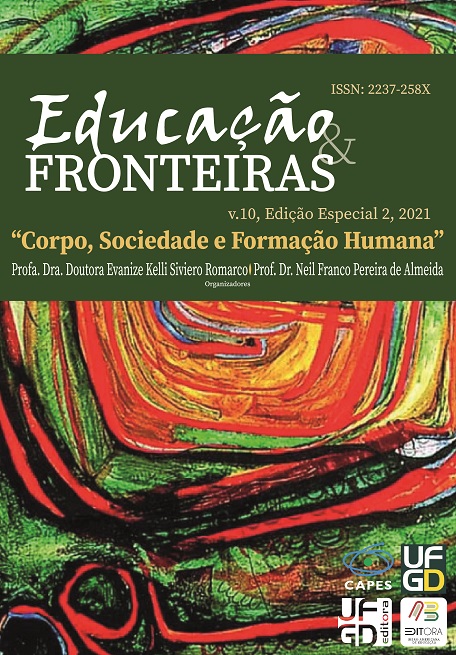Corpo, formação humana e sociedade no contexto da pós-graduação brasileira
DOI:
https://doi.org/10.30612/eduf.v11iesp.2.16480Palavras-chave:
Formação humana, Corpo, SociedadeResumo
O objetivo do presente artigo foi de verificar se a relação corpo e formação humana se encontra presente no contexto da sociedade contemporânea como tema investigativo na produção do conhecimento atual. A proposta desse estudo é decorrente dos diálogos estabelecidos entre os grupos de pesquisa Laboratório de Estudos Corporais – LEC/Unespar e Grupo de Estudo e Pesquisa em Linguagem Corporal e Diversidade – GEPL/UFGD, cujas inquietações balizaram a proposição do curso de extensão Corpo, Formação Humana e Sociedade que teve como objetivo promover diálogos e reflexões interinstitucionais acerca das diferentes concepções de corpo e seus desdobramentos nas práticas corporais contemporâneas. Para a realização da pesquisa, propõe-se um levantamento das produções da pós-graduação brasileira que abordassem os temas: corpo, formação humana e sociedade. Como metodologia, adotou-se o estado do conhecimento conforme procedimentos indicados por Marilia Costa Morosin. Por meio do levantamento realizado, pode-se verificar que a Pós-graduação brasileira tem produzido estudos com a temática corpo, formação humana e sociedade evidenciando o crescimento expressivo no período entre os anos de 2001 e 2010. Esses resultados nos possibilitam entender que “corpo e formação humana” é uma temática que demanda discussões, reflexões e estudos para a construção de um conhecimento basilar na formação dos sujeitos no contexto da sociedade contemporânea.
Downloads
Referências
ABBAGNANO, Nicola. Dicionário de Filosofia. São Paulo: Martins Fontes, 2007.
BRASIL. Coordenação de Aperfeiçoamento de Pessoal de Nível Superior. Ministério da Educação. Cursos Avaliados e Reconhecidos. Brasília, DF: CAPES; MEC, [202-?]. Disponível em: https://sucupira.capes.gov.br/sucupira/public/consultas/coleta/programa/quantitativos/quantitativoRegiao.xhtml. Acesso em: 10 abr. 2021.
DALBOSCO, Claudio Almir; MÜHL, Edson Henrique; FLICKINGER, Hans-Georg. Formação Humana (Bildung): Despedida ou renascimento. São Paulo: Cortez, 2019.
GOERGEN, Pedro. Ciência, sociedade e universidade. Educação & Sociedade, Campinas, v. 19, n. 63, 1998. DOI: 10.1590/S0101-73301998000200005. Disponível em: https://www.scielo.br/j/es/a/mnKFZpVw6hrfb3Jpd3kvR3H/?lang=pt. Acesso em: 10 abr. 2021.
KANT, Immanuel. Sobre a pedagogia. Portugal: edições 70, 2017.
MINAS GERAIS. Programa das Nações Unidas para o Desenvolvimento. Fundação João Pinheiro. Instituto de Pesquisa Econômica Aplicada (IPEA). Desenvolvimento humano nas macrorregiões brasileiras: 2016. Brasília: PNUD; IPE; FJP, 2016. 55 p. Disponível em: https://www.ipea.gov.br/portal/images/stories/PDFs/livros/livros/20160331_livro-idhm.pdf. Acesso em: 10 abr. 2021.
MOROSINI, Marília Costa; FERNANDES, Cleoni Maria Barboza. Estado do Conhecimento: conceitos, finalidades e interlocuções. Educação Por Escrito, Porto Alegre, v. 5, n. 2, p. 154-164, jul./dez. 2014.
RADAR IDHM: evolução do IDHM e de seus índices componentes no período de 2012 a 2017. Brasília, DF: IPEA; PNUD; FJP, 2019.
SEVECENKO, Nicolau. A corrida para o século XXI: No loop da montanha-russa. São Paulo: Companhia das letras, 2001.
Downloads
Publicado
Como Citar
Edição
Seção
Licença
Copyright (c) 2022 Educação e Fronteiras

Este trabalho está licenciado sob uma licença Creative Commons Attribution-NonCommercial 4.0 International License.









